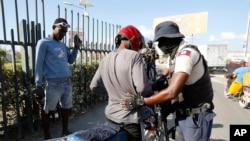Haiti's government said Sunday it remains hopeful for a "swift and positive outcome," after a Kenyan court ruled against Nairobi's plan to deploy police officers to support the troubled island nation's security forces.
The ruling on Friday has thrown into doubt the future of a U.N.-backed multinational force long sought by Haiti's government, which has pleaded for international help to confront its spiraling security crisis.
Kenya's government had previously said it was ready to provide up to 1,000 personnel, an offer welcomed by the United States and other nations that had ruled out putting their own forces on the ground.
The government of Haiti said in a statement Sunday that it was "following developments in Kenya and expects a swift and positive outcome."
It added that it would "like to thank the many countries that have come forward to offer various types of aid to restore order and security as soon as possible."
The Kenyan government has vowed to challenge the high court ruling.
Kenyan President William Ruto has described his country's undertaking as a "mission for humanity," in step with its long record of contributing to peacekeeping missions abroad.
The Western hemisphere's poorest nation, Haiti has been in turmoil for years, with armed gangs taking over parts of the country and unleashing brutal violence, leaving the economy and public health system in tatters.
The 2021 assassination of President Jovenel Moise plunged the country further into chaos. No elections have taken place since 2016 and the presidency remains vacant.
The multinational mission — initially approved for one year — had envisioned Kenyan police on the offensive with their Haitian counterparts, who are outnumbered and outgunned by gang members.
The U.N. Security Council approved the mission in early October.
In the statement, Haiti urged its citizens "to remain calm, to support our security forces and not to allow themselves to be intimidated by disinformation campaigns and threats of violence."




